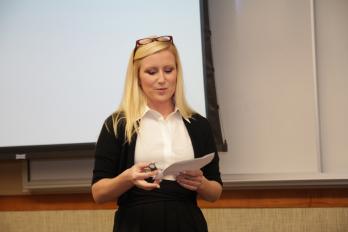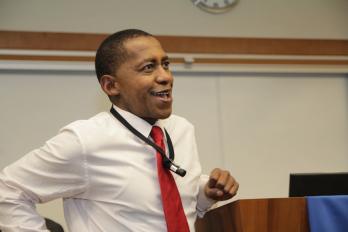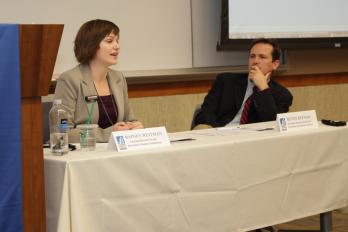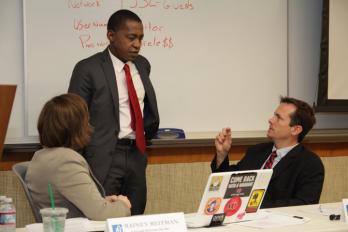SOPA and PIPA are two funny sounding acronyms, but to the two industries fighting it out in the internet copyright war – the entertainment industry and the internet industry - there’s nothing funny about the laws.
The two proposed congressional bills were center stage at a well-attended and lively discussion panel at TJSL on February 8. The Entertainment Law Society (ELS) and the Center for Intellectual Property Law (CLIP) brought in experts to discuss the issue and talk about possible solutions to the internet piracy problem, which the moderator, Professor K.J. Greene, said that most agree costs the entertainment industry millions.
SOPA is the Stop Online Piracy Act and PIPA is the Protect Intellectual Property Act – two bills that were essentially shelved after a huge public outcry in January that included Wikipedia going dark for a day and Google putting a black banner on its logo.
When does free speech become copyright infringement?
“Where do you draw the line between copyright infringing content and non-infringing content?" panelist Kevin Keenan, San Diego’s ACLU Executive Director, asked the audience.
Another panelist, Rainey Reitman, who is the Activism Director of the Electronic Frontier Foundation, is worried that the passage of either of the laws would have created a kind of “copyright police” among internet industry companies.
“SOPA is too broad,” said Keenan. “It would have allowed them to shut down entire websites without due process if they found any copyright infringement.”
“It would be like catching dolphins in tuna nets,” Reitman said, “with the dolphins being legitimate speech.”
Professor Greene, who is a former board member of the ACLU, played Devil’s Advocate to balance the points of view on the panel, since no one from the entertainment industry could be lined up to appear.
“There is so much they can already do under current copyright laws,” said Professor Greene, who was an entertainment law attorney before he joined the TJSL faculty. “At the same time, the music business is not dead, but it’s dying because it is losing so many millions.”
Many of the pirates are "rogue" overseas websites and Reitman said international treaties are being negotiated to try to deal with the issue. “But internet users are being shut out of the room in these discussions,” she said.
Even though SOPA and PIPA are basically frozen due to negative public opinion, the panelists expect some kind of similar legislation to emerge in Congress.
“The SOPA backers spend $90 million to try to get it passed,” said Reitman. “They feel like they’ve paid for it.”
"The panel was phenomenal," said ELS president Lindsey-Shannon Lee. "Ms. Reitman and Mr. Keenan were insightful and dynamic. Their input was thought provoking and informative, and Professor Greene did an amazing job as the moderator. The varied background of attendees made for a very stimulating question and answer session. We were so lucky to host such high caliber individuals."
Watch Video of Professor K.J. Greene Explaining SOPA and PIPA





